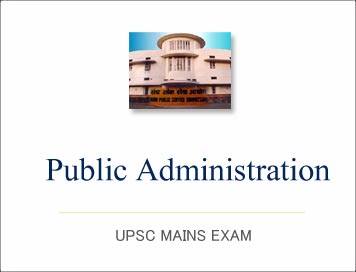(Online Course) Pub Ad for IAS Mains: Civil Services: Civil Service Activism (Paper -2)

(Online Course) Public Administration for IAS Mains Exams
Topic: Civil Services: Civil Service Activism
Civil Services is paid services (servant) of the state chiefly in public administration who support a policy of direct, vigorous action in advancing a project or in strengthening the hold of some ideas. CS as one of the intelligent sections of citizenry and under expanding activities of state, their number is constantly growing therefore to exclude them from the exercise of state, their number is constantly growing therefore to exclude them from the exercise of their active role is to make a fairly large section of citizen body inert.
Too much of protection can reduce a person to cowardice. This is what a happening to civil servants, they willingly become cowards since they do not have courage even to face a transfer or some minor inconvenience for upholding principles of good governance. Like a ‘coward who dies a thousand deaths’ they are compromising and acquiescing every time just to keep and positions safe.
The civil service is not merely the preserve of the ‘generalist’. Governance today is a complex matter. In any case, civil servants are not only responsible for maintaining law and order or collecting revenue, ‘they also head scientific and technical departments. The expansion in the duties of the government, more so since the independence, makes it imperative that the civil services are manned by people with calibre. After all, the standard of administration depends on the people appointed to these very responsible posts. It might even be said that it is the duty of talented young persons to serve the country. There are several examples of civil servants who valiantly crossed seemingly insurmountable hurdles, sometimes at a great cost to their personal lives, and contributed to social development or sought to clean up the system. A few names that readily spring to mind are K.J. Alphons, Arun Bhatia, Keshav Verma, and S.R. Rao. Civil service activism is now a reality. In fact, it would not be an exaggeration to say that civil service provides possibly the best platform for activism. Moreover, since the recruits enter the services in their mid-20s, they can even choose to opt out after serving for a few years, as indeed some do. The wide and varied experience gained as a result of their postings to a diverse variety of jobs stands them in good stead in finding employment opportunities not only in large corporations, but also if they choose, in the voluntary sector, or even in electoral politics. Civil servants work in various capacities as legal representatives of the government, implementing programmes of the popularly elected governments as heads of district administration to jobs at the United Nations and the World Bank, formulating policies which touch the lives of millions of people across the globe. So far, no civil servant has complained that he ‘wasted’ his time while in service, whatever other misgivings he might have.
How useful are the qualities of creativity, honesty, objectivity, diligence, independence of thought, respect for time, and the courage to question the wisdom of superiors in an administrative career in India? Ideally, a developing country such as India needs precisely these same qualities in its administrators. However, the ground reality is quite the opposite.
The administrative structure was not reformed after the independence to suit the needs of the young republic. Moreover, the checks and balances were gradually removed yielding to a lack of accountability and corruption. Since democratic ideals of the founders are yet to be implemented at the grassroot level, there is no public demand that the administrative set up be overhauled. The latter is primarily due to the fact that a large majority of the populace is deprived of basic education, and thus the people are largely unable to demand their fundamental rights through democratic means. Thus ignorance of the public, which had facilitated colonial rule, now facilitates the rule by inefficient and corrupt political class.
One even wonders whether there is a vested interest in maintaining the status quo Whatever be the reasons for it, the administrative machinery, instead of being a dynamic engine of economic growth and social development, has remained a puppet in the hands of its political masters. The results are quite obvious. It is a prevalent belief that a civil servant who displays independence of thought, honesty, and courage to question his superiors is least likely to advance in the administrative hierarchy. The prevailing culture of sycophancy quickly stifles creativity and objectivity. How many of them have applied their special skills and knowledge to offer a solution to the basic problems of the country?
Political Rights of Civil Servants
The principle political activities demanding consideration are
- Parliamentary Candidature and the Services: In India, so far as the question of permitting any section of members of the services to become parliamentary candidate does not seem to have arisen and all government servants alike are forbidden to such candidature without resigning.
- Other Political Activities in National Field, Party or Non-party by
- Individual civil servants is not allowed for holding office, canvassing, public speaking on political controversy is not permitted.
- Membership of civil servants staff association is permitted
- Participation in Local Government Specially Membership of Local Councils and Committees: New Municipal Corporation Act and local Government Act passed subsequent to the reforms of 1919 generally disqualify civil servant for contesting elections.
Safeguards
1. Government servant should not criticize his own department in
non-political matters.
2. If official engages in discussion he should confine to question of facts
only.
3. The need for observance of Official secrets act must be constantly borne in
mind.
4. For attendance at outside conference the permission of head of the department
should be sought and views expressed shall be his personal views.
